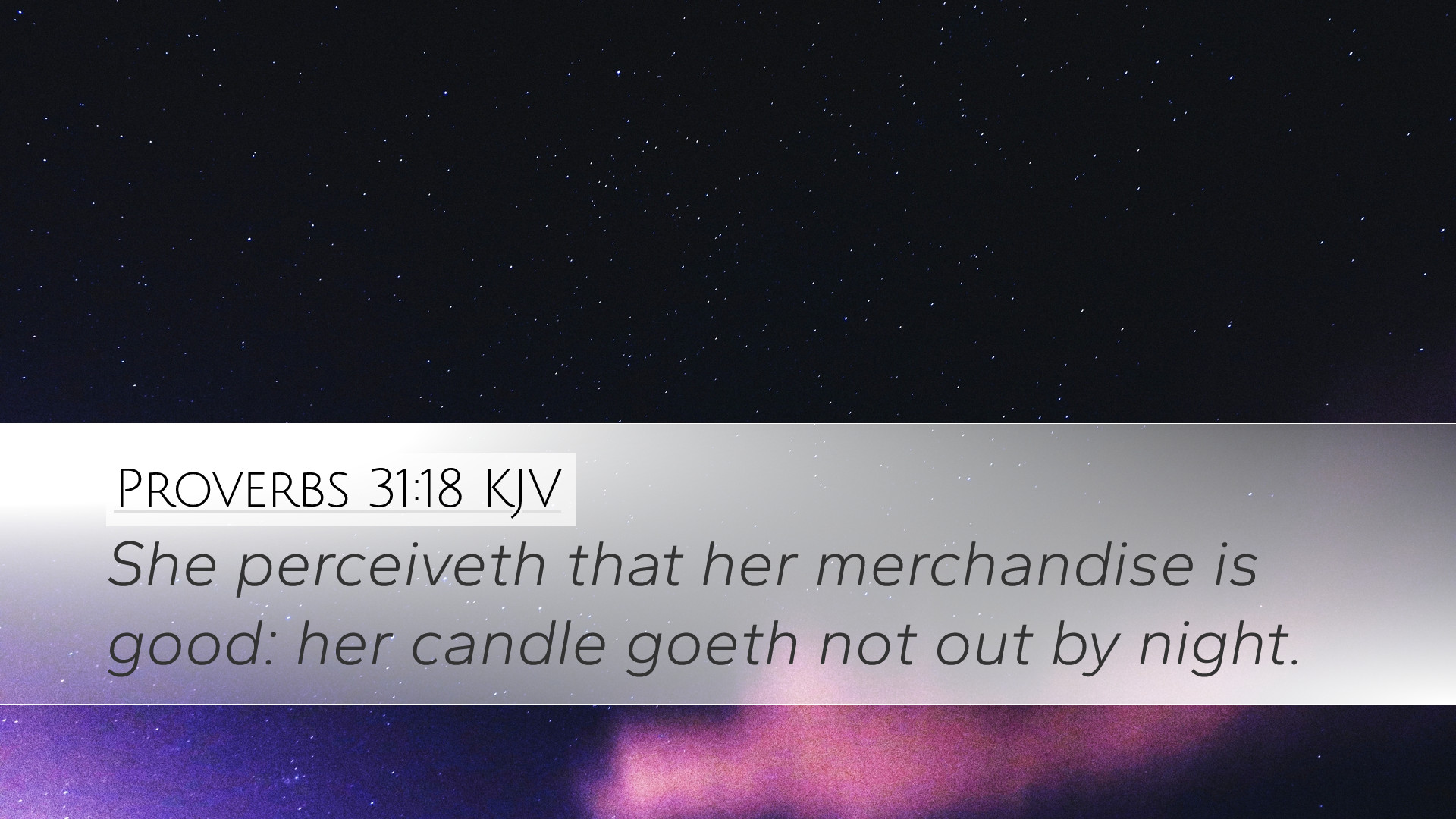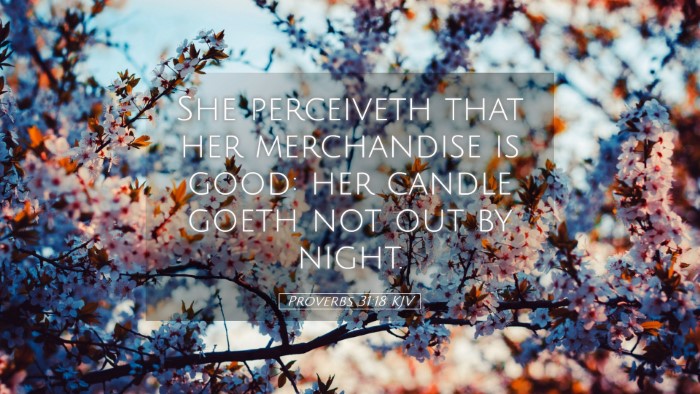Commentary on Proverbs 31:18
Proverbs 31:18 states: "She perceiveth that her merchandise is good: her candle goeth not out by night." This verse highlights the acumen and industrious nature of the virtuous woman depicted in Proverbs 31. A deep exploration of this verse reveals much about the character and virtues that are valued in both the ancient context and contemporary applications.
Insights from Matthew Henry
Matthew Henry offers profound reflections on the description of the virtuous woman. He notes that:
- Perception of Value: The phrase "she perceiveth that her merchandise is good" suggests not just diligence, but discernment. This woman understands the worth of her work—her labor is not done in vain.
- Spiritual Significance: Henry points out that the 'merchandise' can be seen as the fruits of her spiritual labor. She recognizes the value of her endeavors in contributing to the well-being of her household and community.
- Persistence and Resilience: The metaphor of her candle not going out by night is indicative of unwavering commitment. It echoes the idea that true virtue continues to shine, even in darkness, representing endurance and an unwavering work ethic.
Insights from Albert Barnes
Albert Barnes emphasizes the economic and practical dimensions of this passage:
- Entrepreneurial Spirit: Barnes highlights the woman’s engagement in commerce, suggesting a proactive approach to family sustenance. She is not merely a passive observer but an active contributor to her household.
- Wise Stewardship: The virtuous woman exercises wisdom in managing her resources. She is aware of the potential returns on her investments, both material and spiritual, reflecting a holistic approach to stewardship.
- Nighttime Labor: The continuation of her work at night symbolizes a tireless nature. Barnes interprets this as indicative of a broader theme in Proverbs regarding the value of hard work, illustrating that her commitment knows no bounds.
Insights from Adam Clarke
Adam Clarke deepens the exploration of the text by focusing on the metaphorical implications:
- Good Works: Clarke suggests the phrase "her merchandise is good" can be understood in the context of good works done by believers. It implies that her outputs are beneficial to herself and others, aligning with the biblical principle of expressing faith through actions.
- The Candle as a Symbol: The candle is a potent symbol of enlightenment and guidance. Just as a candle sheds light in darkness, the virtuous woman's contributions illuminate the paths of others, whether through her wisdom or her tasks.
- Harmony of Labor and Faith: Clarke posits that this verse praises the harmony between labor and faith. The virtuous woman embodies diligence, suggesting that a faithful life is one that consistently produces good works—her diligence reflects her faith.
Theological Reflections
From the combined insights of these commentaries, it is evident that Proverbs 31:18 embodies profound theological truths:
- Empowerment of Women: This passage uplifts women as vital contributors to their families and communities. It challenges traditional views that limit women’s roles and recognizes their significant impact.
- Value of Diligence: The emphasis on hard work and discernment resonates with biblical principles found throughout Proverbs. The virtuous woman exemplifies the Biblical wisdom that advocates for industriousness and resourcefulness.
- Endurance in Adversity: The verse serves as an encouragement for believers to remain steadfast in their work, reflecting God’s light to the world, especially during challenging times.
Practical Applications for Today
For pastors, students, and theologians, there are several contemporary applications of this verse:
- Modeling Virtuous Leadership: The qualities of the virtuous woman can serve as a model for leadership within both church and community contexts. Her discernment and diligence can inspire others to act with integrity and purpose.
- Encouragement of Work Ethic: This passage can be used to teach about the importance of a strong work ethic anchored in faith. It can guide discussions on how to balance professional responsibilities with spiritual commitments.
- Fostering Community Support: The insights drawn from the verse encourage the building of supportive communities where each individual’s contributions are valued and recognized, fostering mutual growth and encouragement.
Conclusion
In summary, Proverbs 31:18 encapsulates the essence of diligence, discernment, and unwavering commitment. The insights from Matthew Henry, Albert Barnes, and Adam Clarke reveal a multifaceted understanding of the virtuous woman, positioning her as a model for faith-driven engagement in all aspects of life. Pastors, students, and theologians are thus invited to reflect on the implications of embracing these qualities in their own lives and communities.


